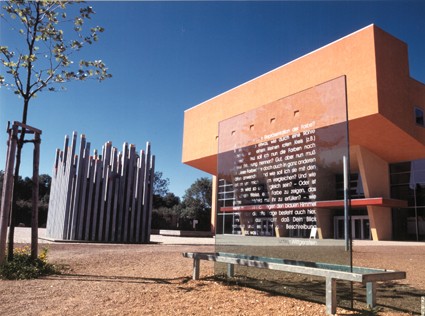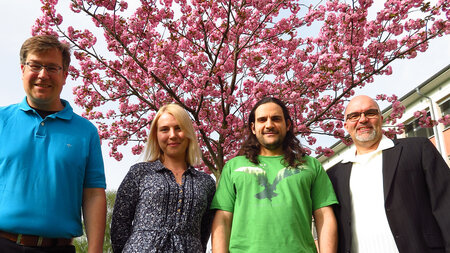Why Study Sociology in Chemnitz?

Dear prospective students interested in a Sociology course in Chemnitz, dear first-year students, we are pleased that you are interested in the academic programmes offered by the Institute of Sociology in Chemnitz, or respectively have already decided to take up your studies here.
Since 1994, Chemnitz offers comprehensive education in the demanding discipline of Sociology, which looks back on a long history.
It is the core belief of our teaching philosophy that profound scientific knowledge and a wide range of scientific key skills form the foundation for the great variety of career paths open to sociologists. Accordingly, we place strong emphasis on intensive educational training combining the fields of
- Sociological theory,
- Empirical research methods, as well as
- Selected sociological fields of application in which we have gained extensive research experience.
While being firmly research oriented, the Chemnitz Sociology programme is organised based on the foundational sociological education of the students, i.e. you study Sociology acquainting yourself with all the necessary fundamental elements established by the German Sociological Association. That means, you will get to understand the discipline of Sociology as a science well founded on theory, supported by empirical research and offering a broad range of practical applications.
The Institute traditionally offers two sociological degree programmes:
Bachelor in Sociology – Master in Sociology
The experiences we gained organising and teaching the successful Diplom programme have been built into the B.A. in Sociology (since 2005) and the M.A. in Sociology (since 2008) consecutive degree programmes, the latter building upon the other.
- In the degree programme of Bachelor in Sociology, students are provided with the fundamental education for the discipline of Sociology, which has a long-standing scientific tradition. The main emphasis is placed on the basics necessary for this subject matter (sociological theory, fundamentals of the analysis of social structure, methods of empirical social research, a selection of special sociologies as specialisation areas, insights into neighbouring disciplines). It is the aim of the programme to provide students with the fundamental science-oriented sociological expertise and skills enabling graduates to either engage in in depth scientific education (e.g. M.A. in Sociology) or to enter more practice-related educational tracks and professions in different fields. The Bachelor dissertation as a personal attainment stands as proof for the successful fundamental educational training of the graduate.
- Having been designed as an advanced-level programme with a distinctly scientific profile in the field of Sociology, the Master in Sociology programme is aimed at graduates with a Bachelor degree and a pronounced orientation towards research. It intends to enable graduates to start an academic career in the narrow sense, or to hold expert or management positions with scientific relevance in practical fields of the society, respectively.
The educational training further develops general sociological and methodical competencies, thus forming the essential basis for an extended specialisation into two application fields closely related to the research profile of the Institute (Health, Work/Technology, Globalisation). The Master dissertation is to make an independent scientific contribution which could form the basis of a subsequent PhD thesis. Students are expected to work mostly independently and to possess strong intrinsic motivation – the degree programme intentionally offers a wide range of possibilities to pursue individual study interests (within the scope of the regulatory framework of the Institute).
If one of the programmes has raised your interest, please, read the following information on our page carefully to find out if the courses offered match your expectations.
Learn more about our degree programmes
Master in Public health Programme
As of the winter semester 2014/15, the Institute offers the new Master programme in Public Health complementing the already existing sociological degree programmes.
This degree programme is organised across faculties (in cooperation with the disciplines of Psychology and Movement Science) and focusses on the areas of health prevention and health-related evaluation. The programme makes a perfect complement to the B.A. programmes offered by the faculty and, not least, also provides new options for Sociology graduates with a B.A. degree concentrating on the special Sociology of Health.
Learn more about the Master programme in Public Health
Guidelines of Teaching
Our Institute has a special commitment to teaching. This is reflected not only in our high-quality courses, but also in the close, advice-centred relationship between our teaching staff and our students that is aligned to four key guidelines:
- A distinctive scientific profile – paying special attention to social practice and topical social problem areas.
- The teaching of fundamental theoretical, methodical and subject area-related concepts – with the possibility to choose individual study foci.
- The orientation of our teaching towards sophisticated expert knowledge – and, at the same time, the targeted consideration of key transferable skills, such as social, communication and methodical skills.
- A mutually open and personal style of communication – accompanied by clear expectations regarding the personal commitment and dedication to the subject matter, and the individual performance will of our students and teaching staff alike.
The Institute’s special interest in teaching excellence is not least reflected by our endeavour to provide high-quality teaching materials based on cutting-edge research, such as textbooks written by our staff members.
What can you do with a Sociology degree?
Maybe you have asked yourself or have been asked this question several times. Here, we have gathered some information for you:
A new information platform provides a very good overview of study options for the subject of Sociology. The answers given to the questions on what Sociology is and what you can do with it are especially informative. Just have a look:
The university’s webpage providing general advice for prospective students could also be useful:
Textbooks from Chemnitz
(in chronological order)
- Fritz Böhle, G. Günter Voß, Günther Wachtler (Hg.), 2010: Handbuch Arbeitssoziologie. Wiesbaden: VS Verlag
- Frank Kleemann, Uwe Krähnke, Ingo Matuschek, 2009: Interpretative Sozialforschung. Eine praxisorientierte Einführung. Wiesbaden: VS Verlag.
- Ditmar Brock, Matthias Junge u.a: 2009: Soziologische Paradigmen nach Talcott Parsons. Eine Einführung. Wiesbaden: VS Verlag.
- Ditmar Brock, 2008: Globalisierung. Wirtschaft – Politik – Kultur - Gesellschaft. Wiesbaden: VS Verlag.
- Dietmar Brock, Mathias Junge, Uwe Krähnke, 2007: Soziologische Theorien von Auguste Comte bis Talcott Parsons. München/Wien: Oldenbourg.
- Ditmar Brock, 2006: Leben in Gesellschaften. Von den Ursprüngen bis zu den alten Hochkulturen. Wiesbaden: VS Verlag.6: Familiensoziologie. Grundlagen und theoretische Perspektiven. 4. Aufl. Wiesbaden: VS Verlag.
- Johannes Kopp, 2008: Bildungssoziologie. Wiesbaden: VS Verlag.
- Ulrich Mueller, Bernhard Nauck, Andreas Diekmann, 2000: Handbuch der Demographie. 2 Bände. Berlin: Springer (unter anderem mit Beiträgen von J. Kopp).
- Bernhard Schäfers, Johannes Kopp, 2006: Grundbegriffe der Soziologie. 9. Aufl. Wiesbaden: VS Verlag (u.a. mit Beiträgen von G.G. Voß und C. Weiske).
Further Information and Course Guidance
PD Dr. S. Rippl (Our Course Guidance Officer)

Mail an Dr. Rippl: susanne.rippl@soziologie.tu-chemnitz.de





